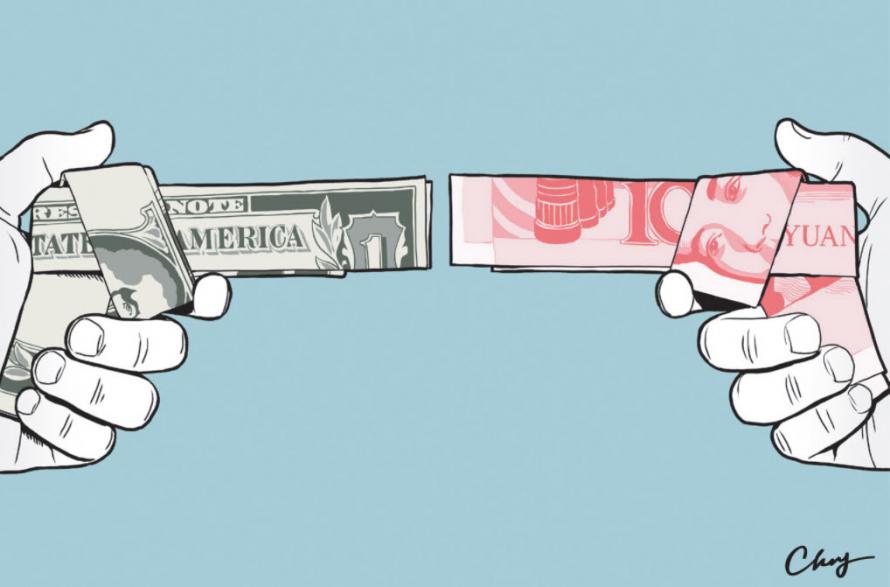After China proposed tit-for-tat import taxes and stock markets fell, there are fears Trump’s aggressive tariffs could cause a slowdown.
Last modified on Wed 4 Apr 2018 21.32 BST,


Last modified on Wed 4 Apr 2018 21.32 BST,

Fears that Donald Trump is embroiling America in a global trade war intensified on Wednesday after China imposed tit-for-tat import taxes on the US and stock markets plunged.
The Dow Jones industrial average dropped and then rallied after markets fell in Europe and Asia on worries of an intensifying trade conflict between the world’s two biggest economies – the latest example of Trump taking his appetite for disruption to the global stage.
After Washington unveiled plans to impose tariffs on $50bn in Chinese imports Tuesday, China hit back with plans to tax a matching $50bn of US products, including beef, cars, planes, soybeans and whiskey.
The US president has worn stock market success as a badge of honour and proof that, despite myriad controversies, the economy is booming under his presidency. But there are concerns that his aggressive tariffs and “America first” instincts could undermine confidence and cause a slowdown.
On Wednesday, Trump moved to play down concerns over a damaging trade war. He protested on Twitter: “We are not in a trade war with China, that war was lost many years ago by the foolish, or incompetent, people who represented the U.S. Now we have a Trade Deficit of $500 Billion a year, with Intellectual Property Theft of another $300 Billion. We cannot let this continue!”
The president added: “When you’re already $500 Billion DOWN, you can’t lose!”
The US commerce secretary, Wilbur Ross, also urged calm. In an interview with CNBC, Ross said the tariffs announced by China amounted to a mere 0.3% of America’s gross domestic product. “So it’s hardly a life-threatening activity,” he said.
Ross added that some US punitive action against Beijing has been “coming for a while” over China’s predatory behaviour involving technology. “What we’re talking about on both sides is a fraction of 1% of both economies,” Ross said.
The tariffs will not take effect immediately. The US government is inviting public comment on its trade sanctions through 11 May and will hold a hearing on the plan on 15 May. China set no date for its 25% duties to take effect, saying it was waiting to see what Trump did.
Speaking at the White House on Wednesday, the spokeswoman Sarah Sanders said: “We’re going through the review period – we’re very lucky that we have the best negotiator at the table in the president.”
She added: “China created this problem, not President Trump” and insisted: “We may have a little bit of short-term pain, but we’re going to have long-term success.”
The departure of Gary Cohn, a former Goldman Sachs banker and so-called “globalist”, as Trump’s top economic adviser, and the appointment of Larry Kudlow as his successor, has been interpreted by analysts as indicating a shift towards protectionist policies.
Asked whether the US tariffs against China were a negotiating ploy, Kudlow told reporters: “Potentially. It’s part of the process. I would take the president seriously on this tariff issue. There are carrots and sticks in life ... Both sides benefit by positive solutions that lower barriers.”
Kudlow said China should take Trump “seriously” on tariffs but that ultimately the president was a “free-trader”. He added: “Sometimes the path to this kind of growth is a little rocky. That’s the way the world works.”
China ran a $375bn goods trade surplus with the US in 2017. Trump has demanded that the China cut the trade gap by $100bn. Beijing said it has made a “request for consultations” at the World Trade Organization (WTO) in response to the US tariffs, triggering that body’s dispute settlement mechanism.
Geng Shuang, a Chinese foreign ministry spokesman, told reporters in Beijing that China’s door to dialogue with Washington remained open “but the US has missed the opportunity time and time again”. He said talks between the two countries required “mutual respect and equal treatment, instead of being coerced by one party unilaterally and condescendingly”.
Economists have expressed concern that global economic activity might stall if other governments are prompted to raise their own import barriers.
William Zarit, chairman of the American Chamber of Commerce in China,told the Associated Press: “US companies at this point would like to see robust communication between the US government and the Chinese government and serious negotiation on both sides, hopefully to avoid a trade war. I can only hope that we solve our differences as soon as possible to avoid damage to the US economy, Chinese economy and to US companies.”
Trump’s praise of the Chinese president, Xi Jinping, and his claim that they have a close personal relationship have not prevented the threat of tariffs. Similarly, Trump continues to say he will try to “get along” with Russian president Vladimir Putin even as relations between the two governments sour.
Ref:https://www.theguardian.com/business/2018/apr/04/trump-china-trade-war-concerns-import-taxes-stock-market
Ref:https://www.theguardian.com/business/2018/apr/04/trump-china-trade-war-concerns-import-taxes-stock-market


No comments:
Post a Comment